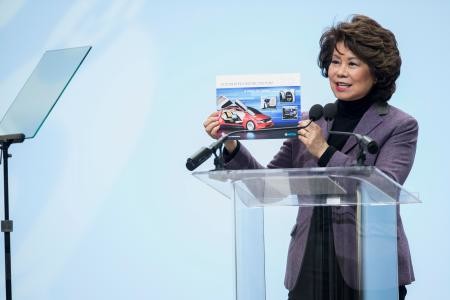DETROIT: The Detroit auto show arrived Sunday with showman’s flair, as the car industry tied its latest offerings to American nostalgia and Hollywood glamor.
But on the sidelines, there were lingering questions about policy and politics.
Arnold Schwarzenegger emerged from a Mercedes-Benz G-Class SUV. The granddaughter of screen legend Steve McQueen arrived in the latest version of the Ford Mustang he immortalized on film.
In a keynote address, US Transportation Secretary Elaine Chao touted just-enacted US tax cuts, which reduced the US corporate tax rate from 35 to 21 percent, saying the move will attract more US investment.
There were also cautious statements about ongoing renegotiations of the North American Free Trade Agreement, on which the North American car industry heavily relies.
But the auto show is about the cars, and automakers did their best to stay focused on their products.
With Americans’ appetite for trucks and SUVs expected to remain robust in 2018, brands highlighted a number of new offerings in that category.
Mercedes-Benz debuted a redesigned G-Class SUV, significantly updating the interior with new technologies. The vehicles were made to climb steep ramps as flames shot up from the ground and confetti cannons blasted. As one finally stopped, Schwarzenegger emerged from a passenger seat.
“I have driven G-Wagens now for 25 years,” glowed the actor of Austrian heritage.
“I think this car became so historic,” he said, “because of its look.”
Ford unveiled its own nostalgic offering, showing off a new mid-sized Ranger pickup, redesigned and reintroduced to the North American market.
It also offered a new sports trim of its Edge SUV, as well a third iteration of a “Bullitt” special edition of its Mustang sports car.
Actor McQueen drove a 1968 Mustang in the thriller film “Bullitt,” creating an indelible link between the car and American pop culture. His granddaughter Molly McQueen emerged from the latest special edition, comparing it favorably with the original.
“It is fun. It’s fast and effortlessly cool,” she said.
In a break from most of the big launches, Volkswagen highlighted a sedan, releasing its updated version of the Jetta, the German automaker’s top-selling vehicle in the US.
The base price of $18,545 won especially loud applause at a glitzy launch, and was a counterpoint to the pricey SUVs and trucks that can easily cost twice that amount and more.
“As a full-line automaker... you need to have a competitive, strong sedan,” VW North American chief executive Hinrich Woebcken told reporters after the launch.
On the sidelines of the flashy announcements, industry insiders were taking a wait-and-see attitude toward talks to revamp the North American Free Trade Agreement, which has generated fears of huge tariffs on Mexican-made imports to the US.
Negotiations have been ongoing for months at the insistence of US President Donald Trump, who has threatened to abandon the agreement if a beneficial deal is not struck.
“There’s good conversation going on to modernize NAFTA,” said Mary Barra, CEO of General Motors. “We’re going to continue to interact constructively to make sure people understand the very complex nature of our business.”
Ray Tanguay, automotive adviser to the Canadian government, highlighted his country’s close ties to the Michigan car industry, and cautioned that losing NAFTA could cost American car buyers higher prices.
“The integration is so much that if you try to break that, you’re going to hurt the consumer,” he said.
Analysts were less certain about potential impacts.
“There continues to be the debate — ‘Is the president using hyperbole to get something less severe because he’s a skilled negotiator, or does he seriously think that we need to be exiting NAFTA,’” said Cox Automotive economist Jonathan Smoke.
Meanwhile, the effects of the recently enacted $1.5 trillion in tax cuts were expected to be varied by region and income level. Among the clearest winners will be luxury vehicles because of the tax bill’s bounty to those with incomes over $150,000 a year, said Smoke.
Highlighting the tax changes, which reduced corporate rates, Chao pointed to Fiat Chrysler’s decision to move production of its Ram trucks from Mexico to an assembly plant near Detroit. The car maker said it would invest $1 billion and add 2,500 jobs.
“This is just one example of the positive impact that the tax cuts and jobs act will have on workers, job creators, employers and our country,” Chao said.
But analysts said many households still don’t have a clear sense of how much they will benefit from the complex changes to tax laws.
“There’s some people that are probably putting off purchases because they don’t really know... what our paychecks are going to look like,” industry analyst Rebecca Lindland of Kelley Blue Book said.
Amid tax and trade concerns, Detroit auto show offers nostalgia, glamor
Amid tax and trade concerns, Detroit auto show offers nostalgia, glamor

World must prioritize resilience over disruption, economic experts warn

- Al-Jadaan said that much of the anxiety dominating markets reflected a world that had already been shifting for years
- Pointing to Asia and the Gulf, Al-Jadaan said that some countries had already built models based on diversification and resilience
DAVOS: Saudi Arabia’s Finance Minister Mohammed Al-Jadaan urged policymakers and investors to “mute the noise” and focus on resilience, as global leaders gathered in Davos on Friday against a backdrop of trade tensions, geopolitical uncertainty and rapid technological change.
Speaking on the final day of the World Economic Forum in Davos, Al-Jadaan said that much of the anxiety dominating markets reflected a world that had already been shifting for years.
“We need to define who ‘we’ are in this so-called new world order,” he said, arguing that many emerging economies had been adapting to a more fragmented global system for decades.
Pointing to Asia and the Gulf, Al-Jadaan said that some countries had already built models based on diversification and resilience. In energy markets, he pointed out that the focus should remain on balancing supply and demand in a way that incentivized investment without harming the global economy.
“Our role in OPEC is to stabilize the market,” he said.
His remarks were echoed by Saudi Arabia’s Minister of Economy and Planning Faisal Alibrahim, who said that uncertainty had weighed heavily on growth, investment and geopolitical risk, but that reality had proven more resilient.
“The economy has adjusted and continues to move forward,” Alibrahim said.
Alibrahim warned that pragmatism had become scarce, trust increasingly transactional, and collaboration more fragile. “Stability cannot be quickly built or bought,” he said.
Alibrahim called for a shift away from preserving the status quo towards the practical ingredients that made cooperation work, stressing discipline and long-term thinking even when views diverged.
Quoting Saudi Arabia’s founding King Abdulaziz Al-Saud, he added: “Facing challenges requires strength and confidence, there is no virtue in weakness. We cannot sit idle.”
President of the European Central Bank Christine Lagarde stressed the importance of distinguishing meaningful data from headline noise, saying: “Our duty as central bankers is to separate the signal from the noise. The real numbers are growth numbers not nominal ones.”
Managing Director of the IMF Kristalina Georgieva echoed Lagarde’s sentiments, saying that the world had entered a more “shock prone” environment shaped by technology and geopolitics.
Director General of the World Trade Organization Ngozi Okonjo-Iweala said that the global trade systems currently in place were remarkably resilient, pointing out that 72 percent of global trade continued despite disruptions.
She urged governments and businesses, however, to avoid overreacting.
Okonjo Iweala said that a return to the old order was unlikely, but trade would remain essential. Georgieva agreed, saying global trade would continue, albeit in a different form.
Georgieva warned that AI would accelerate economic transformation at an unprecedented speed. The IMF expects 60 percent of jobs to be affected by AI, either enhanced or displaced, with entry-level roles and middle-class workers facing the greatest pressure.
Lagarde warned that without cooperation, capital and data flows would suffer, undermining productivity and growth.
Al-Jadaan said that power dynamics had always shaped global relations, but dialogue remained essential. “The fact that thousands of leaders came here says something,” he said. “Some things cannot be done alone.”
In another session titled Geopolitical Risks Outlook for 2026, former US Democratic representative Jane Harman said that because of AI, the world was safer in some ways but worse off in others.
“I think AI can make the world riskier if it gets in the wrong hands and is used without guardrails to kill all of us. But AI also has enormous promise. AI may be a development tool that moves the third world ahead faster than our world, which has pretty messy politics,” she said.
American economist Eswar Prasad said that currently the world was in a “doom loop.”
Prasad said that the global economy was stuck in a negative-feedback loop and economics, domestic politics and geopolitics were only bringing out the worst in each other.
“Technology could lead to shared prosperity but what we are seeing is much more concentration of economic and financial power within and between countries, potentially making it a destabilizing force,” he said.
Prasad predicted that AI and tech development would impact growing economies the most. But he said that there was uncertainty about whether these developments would create job opportunities and growth in developing countries.
Professor of international political economy at the University of New South Wales in Australia, Elizabeth Thurbon, said that China was driving a Green Energy transition in a way that should be modeled by the rest of the world.
“The Chinese government is using the Green Energy Transition to boost energy security and is manufacturing its own energy to reduce reliance on fossil fuel imports,” she explained.
Thurbon said that China was using this transition to boost economic security, social security and geostrategic security. She viewed this as a huge security-enhancing opportunity and every country had the ability to use the energy transition as a national security multiplier.
“We are seeing an enormous dynamism across emerging market economies driven by China. This boom loop is being driven by enormous investments in green energy. Two-thirds of global investment flowing into renewable energy is driven largely by China,” she said.
Thurbon said that China was taking an interesting approach to building relationships with countries by putting economic engagement on the forefront of what they had to offer.
“China is doing all it can to ensure economic partnership with emerging economies are productive. It’s important to approach alliances as not just political alliances but investment in economy, future and the flourishment of a state,” she said.
The panel criticized global economic treaties and laws, and expressed the need for immediate reforms in economic governing bodies.
“If you are a developing economy, the rules of the WTO, for example, are not helpful for you to develop. A lot of the rules make it difficult to pursue an economic development agenda. These regulations are not allowing the economies to grow,” Thurbon said.
“Serious reform must be made in international trade agreements, economic bodies and rules and guidelines,” she added.
Prasad echoed this sentiment and said there was a need for national and international reform in global economic institutions.
“These institutions are not working very well so we can reconfigure them or rebuild them from scratch. But unfortunately the task of rebuilding falls into the hands of those who are shredding them,” he said.
WEF attendees were invited to join the Global Collaboration and Growth meeting to be held in Saudi Arabia in April 2026 to continue addressing the complex global challenges and engage in dialogue.















